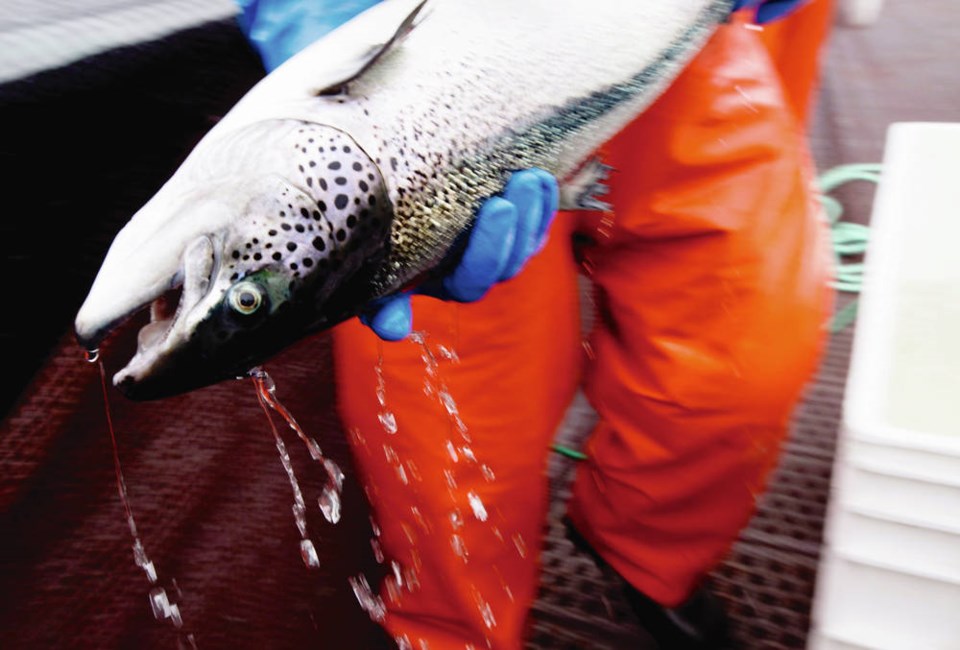A commentary by the general manager of ScaleAQ North America.
We are confused by the Trudeau government’s decision to cut off one of B.C.’s most productive food sectors by closing salmon farms in the Discovery Islands area, off Vancouver Island.
I have spent my entire working life in the Canadian aquaculture industry and know our history and where we are now.
Here is what people need to know: Salmon is one of the cleanest and healthiest proteins you can eat, whether farmed or wild, and contains high levels of the essential fatty acids EPA and DHA, only present in fish.
When raised in the oceans, salmon have the lowest carbon footprint of any farmed protein. The farms take up a tiny physical footprint in our vast, expansive coast. Even within that small space, B.C.’s salmon farmers produce more than 6.5 million meals every week.
Unfortunately, the government’s decision will force a stop to planned investments in a sustainable industry. This will impact our ability to produce healthy and sustainable protein close to the consumers.
There will be increased import of salmon to meet demand. This will increase the carbon footprint of the fish available in Canadian and American supermarkets and restaurants.
Based on the above, it’s hard to make sense of the government’s decision. The decision was based on emotions rather than facts. We would like to invite our government to visit the industry and see how we farm this amazing, tasty and healthy fish.
The salmon farming industry has, through the past 40 years, been in constant development. From its early days, where pioneers hand-fed the fish, to the advanced and efficient farms with high security and control we have today.
The public does not see the development and research done by this industry. We collaborated for 40 years with universities, research and development institutions and governments, and continue to do so. We focus heavily on fish welfare, escapes, biology and technology, to farm this fantastic fish close to local markets.
The industry invests millions of dollars every year to introduce cleaner technologies such as hybrid and full-electric workboats, feed systems and barges.
Through ongoing innovation we are at the cutting edge of precision feed technology, carbon footprint reduction and the overall betterment of the industry. We have made that our life’s work.
Canada has the longest coastline in the world, and B.C. has a unique opportunity to raise some of the best food on the planet.
Governments in other parts of the world have embraced, and work in close collaboration with the industry, to ensure strict regulations, openness, and transparency. It works.
If all you hear is one side of the story, the opposition’s side, you would not know how incredibly innovative aquaculture is.
One area which has come a long way in recent years thanks to ongoing research and development is feeding fish.
Our adversaries talk about waste, but modern feeding systems allow farmers to bring food waste down to essentially zero by counting literally every pellet of feed being fed and monitoring feeding with high-tech underwater cameras and software. Large amounts of data are collected and analysed.
The benefits of aquaculture are understood, the science is clear, and an expanding population will have an increased demand for protein. But the federal government will not even listen or meet with us.
This same government seems excited about salmon farming on the East Coast. In fact, they are encouraging it and investing in it, like other salmon farming regions globally. How can this be?
With the support of government, East Coast communities will benefit, grow and thrive, and lead in clean food production. B.C. will get left behind. All because of a political government decision.
There is another side to the story, the one about supporting a local, clean, sustainable, and innovative farming sector.
Food for thought: This is not the time to be closed-minded about salmon farming in B.C.
- - -
Comment on this article with a letter to the editor: letters@timescolonist.com. Submissions should be no more than 250 words; subject to editing for length and clarity.



